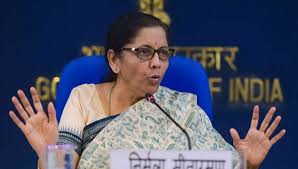Finance minister Nirmala Sitharaman has urged banks to focus on their core business and explore new ways to attract deposits at a time when household savings are increasingly shifting towards alternate investment products.
Noting that “deposit collection is moving slowly”, Sitharaman said lenders should make more efforts to raise small deposits that come in “trickles” but are the “bread and butter” of the banking system.
With the gap between deposits and credit widening, banks need to come up with innovative and attractive schemes to mobilise deposits.
Pointing out that deposits and lending are the two wheels of a cart, the Finance Minister stressed on the need to focus on core banking business.
"Both the Reserve Bank of India and the government have been asking banks to focus on their business activity... they should be aggressive in deposit mobilisation and then lend. That is the core activity of banks," Sitharaman said.
Addressing the media after the board meeting of the RBI, she said there is currently a mismatch between credit and deposit growth and the need of the hour is to balance these two critical elements of the banking business.
She urged banks to return focus on the traditional route of mobilising “small deposits” and not just big or bulk deposits.
“Trickles (small savings) are going to be our bread and butter, money to bank on... that trickle which was the emphasis long back, which kept nothing for the other side (big deposits). Now we've (banks) gone to the other side completely. Now they are chasing bulk deposits to meet their targets," she said. But the requisite small deposit mobilisation is one of the very critical jobs of a bank, she said, adding "it might be grinding monotony, but that's where your bread and butter lies."
The Finance Minister said that even those families who have small savings, they also have got new options to invest even if via stock markets and banks have to compete with those options to attract deposits. “More portfolios are available for more returns on money, that’s why retail investment in markets has gone up. When they have so many options, banks also have to make use of innovative portfolios for attracting investment and deposit mobilisation,” she said.
Stressing that banks should give emphasis on collecting deposits, she said, "RBI has given them some liberty in managing the interest rates. Using that liberty, they should make deposits attractive... bring innovative products and mobilise deposits."
Sitharaman said she would be meeting the heads of banks to discuss strategies for boosting their deposit base, as well as priority sector lending and some government schemes.
During the joint press conference, RBI Governor Shaktikanta Das said that we have been witnessing about 300 to 400 basis points gap between deposits and credit growth, with deposits being lower.
"So at the moment, our effort is to highlight this point. It is kind of a proactive caution for the banks' management that going forward, this may create structural issues with regard to liquidity management. As it stands today, we don't see a crisis. But it has to be attended to."
Banks should leverage their vast branch network to mobilise deposits through innovative means and products, he added.
Das further said interest rates are deregulated and often banks raise deposit rates to attract funds.
Asked if any policy intervention is required to bolster deposit growth, Das said, "India has deregulated interest rates and if you back on regulating deposit and credit rate, it can be retrograde and distort the market."
Earlier this week, while unveiling the bi-monthly monetary policy, Das also had expressed concern over the growing deposit-lending mismatch in the banking sector.
He had said that banks were taking greater recourse to short-term non-retail deposits and other liability instruments to meet the incremental credit demand.
This, he had warned, "may potentially expose the banking system to structural liquidity issues. Banks may, therefore, focus more on mobilisation of household financial savings through innovative products and service offerings and by leveraging fully on their vast branch network."




